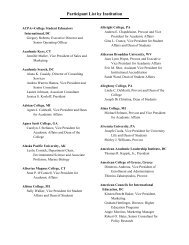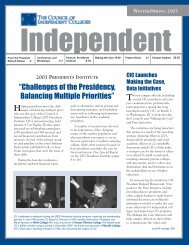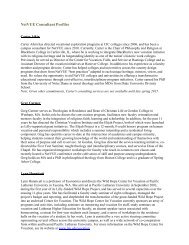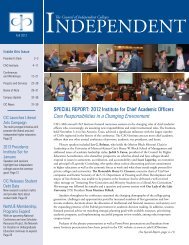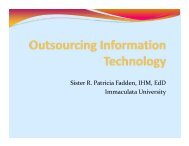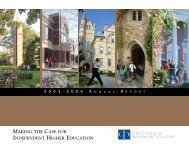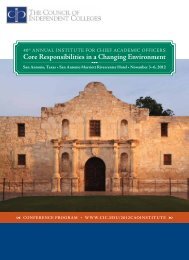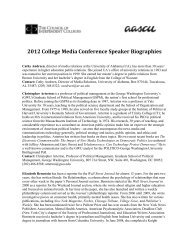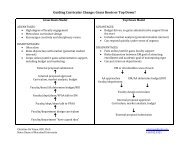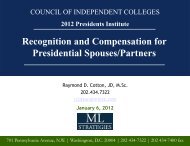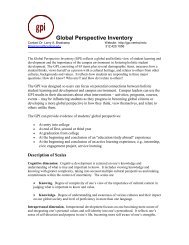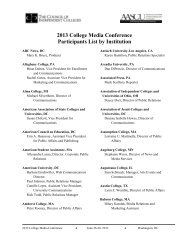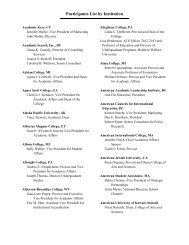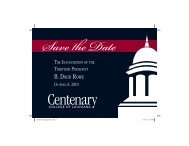Summer 2009 - The Council of Independent Colleges
Summer 2009 - The Council of Independent Colleges
Summer 2009 - The Council of Independent Colleges
Create successful ePaper yourself
Turn your PDF publications into a flip-book with our unique Google optimized e-Paper software.
conferences<br />
(NetVUE Conference, continued from page 7)<br />
“<strong>The</strong> Significance <strong>of</strong> Vocational Exploration for Institutional<br />
Mission”<br />
Beverly Tatum discussed the significance<br />
<strong>of</strong> undergraduate vocational exploration for<br />
furthering the mission <strong>of</strong> an institution <strong>of</strong><br />
higher education. In her opening remarks,<br />
she said, “Our students are inheriting a<br />
complex world with many difficult decisions<br />
to make. <strong>The</strong>y have easy access to plenty<br />
<strong>of</strong> information—but will they use it wisely How do we<br />
adequately prepare our students for wise, ethical, and responsible<br />
leadership”<br />
She stressed that “introspection is the route to selfknowledge,<br />
which is a cornerstone <strong>of</strong> wisdom. If we want our<br />
students to live compelling lives, lives <strong>of</strong> deep meaning and<br />
purpose—if we want to fulfill our missions—develop that<br />
intellectual, ethical, and leadership potential as we promise to<br />
do—we must create some space for reflection. How do we do that<br />
in the secular academy”<br />
She <strong>of</strong>fered four suggestions to address that question:<br />
1. Teach about issues <strong>of</strong> social justice. “Exploration <strong>of</strong><br />
such social justice issues as power and privilege inevitably<br />
awakens the spirit,” Tatum said. “Racism, like the other<br />
’isms <strong>of</strong> sexism, classism, anti-Semitism, heterosexism,<br />
and ableism, is a powerful source <strong>of</strong> disconnection in our<br />
society. All <strong>of</strong> the ’isms alienate us not only from others<br />
but also from ourselves and our own experiences.”<br />
2. Build reflection into one’s teaching. Tatum noted that,<br />
“At Spelman we are introducing the use <strong>of</strong> electronic<br />
portfolios as part <strong>of</strong> the first year seminar experience,<br />
with the intent <strong>of</strong> carrying it through to the senior year.<br />
<strong>The</strong> act <strong>of</strong> identifying which pieces <strong>of</strong> work you want<br />
to include in the portfolio, and why you have selected<br />
them and presented them in a particular way is an act<br />
<strong>of</strong> reflection which inevitably reveals one’s passions and<br />
perhaps leads one to her sense <strong>of</strong> vocation, as she brings<br />
forward her best work. It can be done if we consider it<br />
important.”<br />
3. Create co-curricular spaces for reflection. “This is<br />
important not just for students but for faculty and<br />
staff,” said Tatum. “At Spelman, the WISDOM Center<br />
(Women in Spiritual Discernment <strong>of</strong> Ministry) provides<br />
programs and also occupies a physical space, including a<br />
room for meditation,” she said, noting that two faculty<br />
members have volunteered to lead guided meditation.<br />
4. Model the behavior. Tatum encouraged conference<br />
participants to “Talk about your own journey when given<br />
the opportunity. Whenever we have the chance, we can<br />
talk about our own practice,” she said. “Mention that you<br />
write in a journal. Be seen in the silent spaces.”<br />
“Vocation, the Pr<strong>of</strong>essions, and the Liberal Arts”<br />
William May examined issues that lie at the<br />
intersection <strong>of</strong> vocation, the pr<strong>of</strong>essions, and<br />
the liberal arts, addressing the question: How<br />
can programs in the exploration <strong>of</strong> vocation<br />
help to reaffirm the multiple aims <strong>of</strong> academic<br />
institutions<br />
“<strong>The</strong> liberal arts college in the 19 th century,<br />
largely Protestant in origin and small town in its setting, found<br />
its common ground in a general consensus on ends and goals<br />
that shaped its life,” said May. “Reflecting this consensus, the<br />
president <strong>of</strong> the college <strong>of</strong>ten taught a course in ethics for all<br />
graduating seniors. This arrangement...<strong>of</strong>fered an important<br />
symbol. Ethics had not yet contracted into a merely technical<br />
subspecialty in religious or philosophical studies; it served rather<br />
to crown the student’s education.” In contrast, he said, “<strong>The</strong> 20 th<br />
century positivist university no longer looked to substantive ends<br />
and goals to supply the institution with its common ground.<br />
Indeed, teachers in the disinterested pursuit <strong>of</strong> the truth needed<br />
to shed their values before entering the classroom. Values express<br />
only subjective, emotive preferences.”<br />
May noted that, “Ultimately, this objectivist creed <strong>of</strong> the<br />
faculty encouraged careerism in students. Teachers can transmit<br />
a knowledge-based power, but they cannot raise questions about<br />
its responsible uses without descending into advocacy. Thus<br />
graduates can treat their knowledge as a purely private possession<br />
to manage as they please in the pursuit <strong>of</strong> their careers....”<br />
Citing three ancient purposes <strong>of</strong> the liberal arts college, May<br />
asserted that these remain a part <strong>of</strong> the vocation or calling <strong>of</strong> the<br />
small private college that today seeks to serve the common good:<br />
1. Honing critical intelligence. “<strong>The</strong> task <strong>of</strong> criticism in<br />
the intellectual life includes making judgments as to<br />
worth and value in the spheres <strong>of</strong> politics, art, economics,<br />
religion, philosophy, and morals,” May said. “<strong>The</strong><br />
university is precisely the site where critical inquiry ought<br />
to occur, considering and weighing alternative goals for<br />
the society at large and for the pr<strong>of</strong>essions in particular.”<br />
2. Cultivating the civic self. “<strong>The</strong> university must accept as<br />
part <strong>of</strong> its most comprehensive purpose the cultivation <strong>of</strong><br />
the civic self—the art <strong>of</strong> acting in concert with others for<br />
the common good to engage in critical inquiry is itself a<br />
social act that teases the mind out <strong>of</strong> the bottle <strong>of</strong> private<br />
preference and opens it out toward a community <strong>of</strong><br />
inquirers,” said May.<br />
3. Preparing all graduates to be good teachers. “<strong>The</strong><br />
university must turn out pr<strong>of</strong>essionals who are good<br />
teachers,” May said. “We must help cultivate in<br />
students, whatever their vocation, the qualities <strong>of</strong> a good<br />
teacher—a capacity for critical inquiry, a direct grasp<br />
<strong>of</strong> their subject, a desire to share it, verbal facility, and<br />
sensitivity to one’s audience.”<br />
8 <strong>Independent</strong> | <strong>Summer</strong> <strong>2009</strong>



